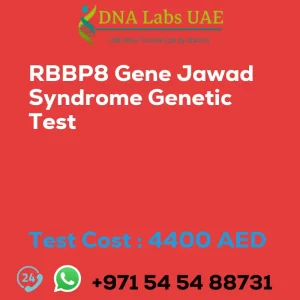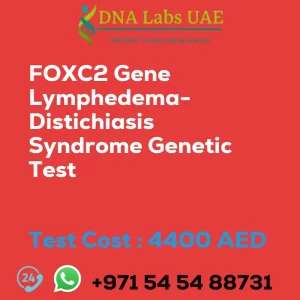COL2A1 Gene Kniest dysplasia Genetic Test
Components: COL2A1 Gene Kniest dysplasia Genetic Test
Price: 4400.0 AED
Sample Condition: Blood or Extracted DNA or One drop Blood on FTA Card
Report Delivery: 3 to 4 Weeks
Method: NGS Technology
Test type: Dysmorphology
Doctor: Pediatrics
Test Department: Genetics
Pre Test Information: Clinical History of Patient who is going for COL2A1 Gene Kniest dysplasia NGS Genetic DNA Test. A Genetic Counselling session to draw a pedigree chart of family members affected with COL2A1 Gene Kniest dysplasia NGS Genetic DNA Test gene COL2A1
Test Details
The COL2A1 gene is associated with a condition called Kniest dysplasia. Kniest dysplasia is a rare genetic disorder that affects the development of the bones and connective tissues, particularly in the spine and limbs. It is characterized by short stature, a shortened trunk, joint deformities, and facial abnormalities.
NGS (Next-Generation Sequencing) genetic testing is a method used to analyze multiple genes simultaneously, allowing for the detection of genetic variations or mutations that may be responsible for a particular condition. In the case of Kniest dysplasia, NGS genetic testing can be used to identify mutations in the COL2A1 gene that are associated with the disorder.
By analyzing the DNA of an individual, NGS genetic testing can provide information about specific genetic changes that may be present and help confirm a diagnosis of Kniest dysplasia. This can be particularly useful in cases where the clinical features of the condition are not clear or when other diagnostic methods have been inconclusive.
NGS genetic testing can also be used for carrier testing, prenatal testing, and to provide information about the risk of passing on the condition to future generations. Additionally, it can aid in genetic counseling and management of the condition.
It is important to note that NGS genetic testing is typically performed by a healthcare professional, such as a geneticist or genetic counselor, and the results should be interpreted in conjunction with a comprehensive clinical evaluation.
| Test Name | COL2A1 Gene Kniest dysplasia Genetic Test |
|---|---|
| Components | |
| Price | 4400.0 AED |
| Sample Condition | Blood or Extracted DNA or One drop Blood on FTA Card |
| Report Delivery | 3 to 4 Weeks |
| Method | NGS Technology |
| Test type | Dysmorphology |
| Doctor | Pediatrics |
| Test Department: | Genetics |
| Pre Test Information | Clinical History of Patient who is going for COL2A1 Gene Kniest dysplasia NGS Genetic DNA Test. A Genetic Counselling session to draw a pedigree chart of family members affected with COL2A1 Gene Kniest dysplasia NGS Genetic DNA Test gene COL2A1 |
| Test Details |
The COL2A1 gene is associated with a condition called Kniest dysplasia. Kniest dysplasia is a rare genetic disorder that affects the development of the bones and connective tissues, particularly in the spine and limbs. It is characterized by short stature, a shortened trunk, joint deformities, and facial abnormalities. NGS (Next-Generation Sequencing) genetic testing is a method used to analyze multiple genes simultaneously, allowing for the detection of genetic variations or mutations that may be responsible for a particular condition. In the case of Kniest dysplasia, NGS genetic testing can be used to identify mutations in the COL2A1 gene that are associated with the disorder. By analyzing the DNA of an individual, NGS genetic testing can provide information about specific genetic changes that may be present and help confirm a diagnosis of Kniest dysplasia. This can be particularly useful in cases where the clinical features of the condition are not clear or when other diagnostic methods have been inconclusive. NGS genetic testing can also be used for carrier testing, prenatal testing, and to provide information about the risk of passing on the condition to future generations. Additionally, it can aid in genetic counseling and management of the condition. It is important to note that NGS genetic testing is typically performed by a healthcare professional, such as a geneticist or genetic counselor, and the results should be interpreted in conjunction with a comprehensive clinical evaluation. |








